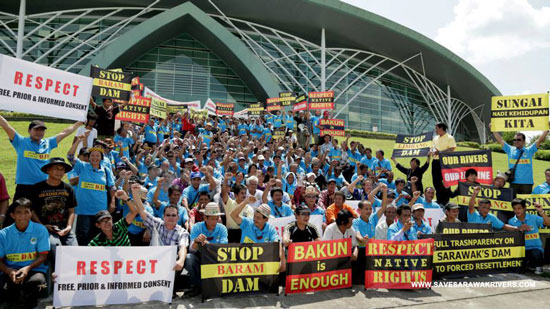Former Australian Greens leader Bob Brown says “a living culture is facing death” in Malaysian Borneo, where the planned construction of a string of hydroelectric dams would flood the lands of tens of thousands of indigenous people.
Brown is in Sarawak, Malaysia’s biggest state, to attend three days of protests and meetings organised to coincide with the biennial congress of the International Hydropower Association being held in Kuching.
Three hydroelectric dams have been built in Sarawak already, one of which flooded an area the size of Singapore and was labelled “a monument to corruption” by Transparency International.
A Singapore University report (pdf) found that the resettlement of 10,000 indigenous people to make way for the Bakun dam “required a fundamental shift in the way of life of these communities and has threatened the maintenance of traditional knowledge systems”.
There has been widespread disaffection among those forcibly resettled, many of whom now lack enough land to support themselves. Promised compensation and services have not been delivered, many say.
The government of Sarawak plans to build between nine and 50 more dams to generate power for energy-intensive industries it hopes to attract to the state.
State electricity company Sarawak Energy has a current shortlist of projects that would increase installed capacity in Sarawak to around seven times current demand.

One of the next dams to be constructed, on the Baram, Sarawak’s second-longest river, would displace an estimated 20,000 people.
At the conference on Wednesday Sarawak Energy CEO Torstein Sjøtveit told delegates that energy was essential for socioeconomic growth.
“Developing countries should be allowed to develop. It is difficult for me to understand why the developed world keeps hammering the developing world about sustainability,” Sjøtveit said.
But Brown believes the development agenda in Sarawak is being driven by the vested interests of its Chief Minister, Abdul Taib Mahmud.
“A problem here in Sarawak is the Taib government — the extraordinary wealth and power and greed that’s driving the dam expansion now that 95 per cent of the primary forests are gone,” Brown says.
Companies linked to Sarawak’s Chief Minister have been awarded contracts worth more than US$220 million by Sarawak Energy since 2009, according to the Swiss-based NGO Bruno Manser Fund (pdf).
Taib has been under investigation by the Malaysian Anti-Corruption Commission since 2011 and was recently implicated in fresh allegations arising from a hidden-camera video made by natural resource campaign group Global Witness, as I wrote in New Matilda earlier this week.
Brown received lengthy applause at an “alternative congress” in Kuching yesterday after he showed a film about the Franklin River blockade and told the crowd they had a right to protest and could turn things around.
Around half the protesters were indigenous people who live semi-traditional lifestyles on the upper reaches of Sarawak’s rivers, and many had never been to the state capital or attended a large demonstration before.
A representative of local campaign group Save Sarawak Rivers was met briefly by the head of the International Hydropower Association, Richard Taylor, outside the Borneo Convention Centre yesterday, where 300 demonstrators had gathered.
“We pressed him for an assurance that the IHA won’t get involved with Sarawak Energy or the state government of Sarawak,” Save Rivers secretary Mark Bujang said, “because this is a corrupt regime and we don’t want the IHA coming in to Sarawak to promote dams here.”
Brown says that while protesters got their message across to industry leaders at the conference, they shouldn’t rely on them for help.
“It’s public opinion that will save the rivers of Sarawak, not the good heart of multinational dam builders or the Taib government,” he said.
Australian-based engineering consultants SMEC were recently awarded a contract to undertake “early works” on one of Sarawak’s dam projects.
Tasmanian government-owned enterprise Hydro Tasmania has been contributing expertise through the consultancy services of its subsidiary, Entura, and the secondment of senior staff to Sarawak Energy.
Donate To New Matilda
New Matilda is a small, independent media outlet. We survive through reader contributions, and never losing a lawsuit. If you got something from this article, giving something back helps us to continue speaking truth to power. Every little bit counts.



